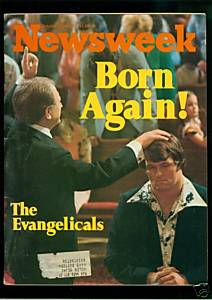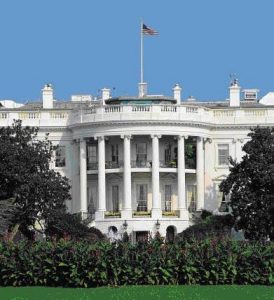What does it mean to be a Christian in America? These last few weeks, with presidential campaigns in full gear, this has become an unavoidable question.
This important ethical question is too often reduced to caricatures: withdrawal from politics on one side and assumption that the church is the fourth branch of government on the other. In my own life, neither of these positions captures where I am. I love Jesus; as an old spiritual goes, “You may have all this world, give me Jesus.” But I’m also proud of America; or more specifically, I am proud of the founding ideals of our nation and the vision of freedom that we lift up. For lack of a better word, I am a Christian patriot. And it is a phrase that I need to explain, if only for myself.
Many decades ago the poet Langston Hughes wrote of his complicated relationship to America. He was a gay black man, living in a time when he could not vote nor be welcomed in much of America, a time when his own love dare not speak its name. And yet he was deeply American. And so he wrote:
O yes, I say it plain,
America never was America to me,
and yet I swear this oath-
America will be!
An ever-living seed, its dream
lies deep in the heart of me.
Langston Hughes wrote from that vulnerable, painful place, in which he was caught between the reality of what America was for him as a gay black man in the 1930’s and the hope deep in his heart for what America could be. To me, Christian patriotism means living in that place – aware of all that is wrong in our society and government and yet deeply hopeful nonetheless.
My own frustrations and hopes for America are shaped by the life and teachings of Jesus. Jesus once summarized his work, “Come to me, all you that are weary and are carrying heavy burdens, and I will give you rest.” These were his words to the poor, those imprisoned under Roman occupation, the homeless and the destitute, the addicted and the depressed; to all the people on the outside of life, he said, “Come in and you will find rest for your souls.”
I can’t help but move from these words of invitation to the outcasts of his day to the ideals and dreams of our nation. I hear the words of Jesus echoed in the poem etched beneath the Statue of Liberty, where Emma Lazarus wrote,
“Keep ancient lands,
Your storied pomp!”
Cries she
With silent lips.
“Give me your tired, your poor,
Your huddled masses yearning to breathe free,
The wretched refuse of your teeming shore.
Send these, the homeless, tempest-tossed to me;
I lift my lamp beside the golden door!”
At its best, our nation tries to live out the words of the Statue of Liberty, and the example of Jesus, in building an inclusive society. And when it does my heart fills with pride. And when we don’t, when we inevitably fall short, then my faith leads me to speak critically, engagingly with the place I love. To me that is what it means to be a Christian patriot.
I said earlier that a Christian patriot stands in that vulnerable place, like Langston Hughes, between what America is and what America could be, and we make sense of our situation in light of the life and teachings of Jesus. As I stand in that place, I see several challenges we face as a nation to which we as Christians are called to respond.
A Christian patriot is concerned with the welfare of our fellow citizens. Ronald Reagan, in his first inaugural address, gave voice to this, when he said,
“We shall reflect the compassion that is so much a part of your makeup. How can we love our country and not love our countrymen; and loving them, reach out a hand when they fall, heal them when they’re sick, and provide opportunity to make them self-sufficient so they will be equal in fact and not just in theory?”
That is a question I live with in my faith and in my love of country: how can we make people equal in fact and not just in theory? How is it that we can make people born in poverty in our central city equal to those born in the affluence of our suburbs, in fact and not just in theory? How can we make minimum wage workers with no sick days and CEO’s making 200 times as much equal in fact and not just in theory? How is it that we can make committed lesbian couples and committed straight couples equal in fact and not just in theory? As Reagan says, our love of country leads us to a love of our fellow citizens, demanding that we find some answers.
But as a Christian, my love leads me beyond the boundaries and the limits of America. I love my fellow citizens, certainly; but I feel that I have not only a citizenship in America but a citizenship in the Kingdom of God. Paul once wrote that through Baptism we are all made one: there is no longer slave nor free, Jew nor Greek, male nor female, but all are one in Christ Jesus. And so my faith takes me beyond the confines of America, and well beyond the wall we are building on our southern border, to ask, in the manner of Reagan, how can we love God’s kingdom and not love our fellow humans; and loving them, reach out a hand?
Reagan himself saw the obligations of our country calling us out to help neighbors near and far; and while I may disagree with how he practiced this, I am still moved by his words at the Berlin Wall, as when he said, “Mr. Gorbachev, tear down this wall.” Before he got to that dramatic crescendo in his speech, he framed the division of East and West Germany as a problem for all humanity; saying,
“[The West German President] has said, “The German question is open as long as the Brandenburg Gate is closed.” Today I say: As long as the gate is closed, as long as this scar of a wall is permitted to stand, it is not the German question alone that remains open, but the question of freedom for all mankind.”
Truly, as Christians, our compassion moves from love of our fellow citizens to solidarity with people throughout the world.
Of course in our day there is a new wall going up, cutting through a continent, a wall separating West Texas from East Mexico; and if I can use Reagan’s words, it’s a scar, one that leads me to say that as long as the gates to America are closed to the huddled masses then the question of freedom for all humankind remains open.
And it remains open while monks in Tibet are locked up for dreaming of freedom or when mothers in Darfur must flee gun wielding men on horseback. As a Christian patriot, my compassion moves from our own shores out to other places – wherever poverty, violence, and environmental degradation rage. Those who demand my care are not just my American brothers and sisters, but truly all the sons and daughters of God.
Yet it would be the essence of hubris to think we come as Americans with all the answers to people in need, who are just waiting to throw roses on our path. As a Christian, I find it essential to see my fellow citizens in the kingdom of God as equals, people who can be full partners with me and our nation in solving our common problems.
In many ways this thought was behind the famous line from John Kennedy’s first inaugural, in which he said, “Ask not what your country can do.” He led into that part of the speech, echoing the apostle Paul, saying,
“Now the trumpet summons us again – not as a call to bear arms, though arms we need; not as a call to battle, though embattled we are – but a call to bear the burden of a long twilight struggle, year in and year out, “rejoicing in hope, patient in tribulation” – a struggle against the common enemies of man: tyranny, poverty, disease, and war itself.”
And then the iconic phrase, “And so, my fellow Americans: ask not what your country can do for you – ask what you can do for your country.” Most have heard that line countless times; but we ought to remember as well what Kennedy said next, “My fellow citizens of the world: ask not what America will do for you, but what together we can do for the freedom of man.”
That is the important direction of Christian patriotism: we look to all the people of the world, not as recipients of our largess, but as fellow-workers, allies, and compatriots in the struggle to tackle the world’s problems. Just as my compassion extends beyond America to all the people of the world; so too, I am committed to work with them as equals. And I think that as Christians in America, we are called to work with people around the world on issues like global warming, the prevention of genocide, and the creation of free societies, not as colonial masters but as equal partners.
Finally, and perhaps most importantly, there are a series of questions that must be asked in America, and perhaps can best be asked by people of faith, that can never be answered by the state. Robert Kennedy, on the campaign trail shortly before his assassination, questioned our spiritual health amidst our material abundance.
He said,
“We seem to have surrendered community excellence and community values in the mere accumulation of material things. Our gross national product, by now, is over eight hundred billion dollars a year, but that GNP – if we should judge America by that – counts air pollution; and the cost of a nuclear warhead;’ and the television programs which glorify violence in order to sell toys to our children.”
“Yet the gross national product does not allow for the health of our children, the quality of their education, or the joy of their play; It measures neither our wit nor our courage; neither our compassion nor our devotion to our country; it measures everything, in short, except that which makes life worthwhile. And it can tell us everything about America except why we are proud that we are Americans.”
In the end, the call of Christian patriotism is to raise our sights as a nation beyond the accumulation of things to the service of people and the creation of meaningful community.
It was, in the end, not a life of leisure, not a life of material abundance, not a life of profiteering that gave Jesus’ disciples rest. No, the rest of their souls came in the quality of their life together – their friendships, their service, their joy in another. Jesus didn’t call them shareholders, but disciples and friends; he didn’t promise them wealth, but instead promised them love; which reminds me that as a Christian who loves America that the measure of our success as a nation is not how much we acquire, nor the power we project, but the love of neighbor we practice, near and far.
My faith shapes my love for America; focusing me not on a simple pride of place but rather a hope in building a more inclusive society. It leaves me, as a Christian patriot, with compassion for my fellow citizens; it extends my compassion beyond the narrow bounds of our nation; causes me to see all people as my equals in the struggle against poverty, tyranny, disease and violence; and in the end, my faith leads me to seek, near and far, a more loving community, where all souls can be at rest.
Rev. Andrew Warner
Plymouth Church Milwaukee, WI
Eric Liu and Nick Hanauer’s book, The True Patriot, (Sasquatch Books, Seattle, 2007) were the source of quotes from Langston Hughes, John F. Kennedy, and Robert Kennedy. Quotes from Ronald Reagan’s speeches were from his presidential library.



